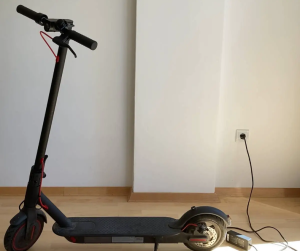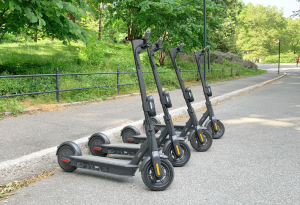Electric scooters typically charge in 4 to 8 hours, varying by model.
Overview of Electric Scooter Charging
Electric scooters, gaining momentum as a preferred mode of urban transport, hinge on innovative charging technology. This technology underpins their efficiency and usability. The charging process, crucial to the scooter’s performance, intertwines several technical details, each playing a pivotal role in the user’s experience.
Understanding Electric Scooter Batteries
Electric scooters primarily harness the power of lithium-ion batteries, celebrated for their high energy density and durability. These batteries, a key component in determining both range and scooter lifespan, usually offer a capacity between 250 to 750 Wh. This capacity translates into an impressive range of 15 to 50 miles per charge. Markedly, the lifespan of these batteries extends to about 500 to 1000 charge cycles, ensuring a prolonged usage period before needing replacement. According to a Wikipedia entry, ongoing advancements in lithium-ion technology continually enhance energy density and charging speed.
Charging these batteries demands precision. To avoid efficiency losses or damage, using the manufacturer-recommended charger is advisable. Generally, charging a typical electric scooter battery fully takes about 4 to 8 hours, a crucial factor for daily commuters.
Standard Charging Technology in Electric Scooters
Electric scooters typically employ a direct charging method, where a dedicated charger connects the scooter to a power source. These chargers usually work within 2 to 4 Amps, striking a balance between quick charging and battery health preservation. They convert AC power from wall outlets to DC power, suitable for the scooter’s battery. The onboard charging circuitry of the scooter ensures this conversion process is both safe and efficient.
Recent studies highlight significant improvements in charger technology, leading to more efficient charging. These chargers often boast an efficiency rate of 85-90%, significantly impacting the scooter’s overall energy consumption. Notably, higher efficiency chargers cut down on energy wastage, aligning with environmentally friendly practices.
The cost of these chargers, varying between $30 to $100, factors into the total investment for an electric scooter. This cost generally reflects the charger’s power output and features like fast or smart charging. Manufacturers are continuously striving to reduce these costs, making electric scooters an increasingly affordable and sustainable choice for urban commuters.
The intricacies of charging technology and battery management are fundamental in defining electric scooters’ efficiency, performance, and convenience. A deeper understanding of these elements enables users to make more informed choices, balancing performance with the longevity of their electric scooters.
Factors Influencing Charging Speed
The speed at which electric scooters charge is not a static metric; it varies based on several factors. Understanding these can be crucial for users who rely on their scooters for daily commuting or leisure activities.
Battery Capacity and Composition
The capacity and composition of an electric scooter’s battery are primary determinants of its charging speed. Batteries, typically measured in Watt-hours (Wh), have varying capacities, usually ranging from 250 Wh to 750 Wh. The higher the capacity, the longer the charging time, as there’s simply more battery to fill up.
Lithium-ion batteries, the standard in modern electric scooters, offer a blend of high energy density and longevity. These batteries have evolved significantly, with newer versions charging faster than their predecessors. For instance, a 500 Wh battery may take approximately 5 hours to charge fully using a standard charger, while a more advanced version might reduce this time significantly.
Battery composition also plays a vital role. Scooters with lithium-polymer batteries might experience different charging speeds compared to those with standard lithium-ion batteries. The former usually charges faster but may not offer the same life span or energy density as the latter.
Charger Specifications and Power Output
The specifications of the charger, particularly its power output, greatly influence the charging speed. Chargers come with different power ratings, typically ranging from 1A to 5A. A higher amperage charger will charge a scooter battery faster than a lower amperage one.
For example, a 2A charger may take about 6 hours to fully charge a 500 Wh battery, while a 4A charger might do the same in just 3 hours. However, it’s essential to use a charger compatible with the scooter’s battery to prevent damage. Using a charger with too high an amperage can overheat the battery, reducing its lifespan.
Environmental Conditions Affecting Charging
The environment in which a scooter is charged also impacts the charging speed. Key factors include:
- Temperature: Extreme temperatures, both hot and cold, can affect battery performance. Lithium-ion batteries, for instance, charge best at room temperature. Charging a scooter in very cold or hot conditions might take longer and can even degrade the battery’s health.
- Humidity: High levels of humidity can also affect the charging process, potentially causing corrosion or other damage to the battery and its connections.
- Altitude: Charging at high altitudes might affect the efficiency of the battery and the charger, potentially slowing down the charging process.
The charging speed of electric scooters hinges on a delicate balance of factors like battery capacity and composition, charger specifications, and environmental conditions. Users should consider these factors to optimize charging times and extend the life of their scooter’s battery. Advancements in battery and charger technology continue to improve charging speeds, making electric scooters an increasingly efficient mode of transportation.
Charging Speeds of Popular Electric Scooter Models
The world of electric scooters is vast and varied, with each model bringing its own set of features and capabilities, especially when it comes to charging speeds. This diversity caters to a wide array of user preferences and needs, making the choice of the right scooter a crucial decision.
Comparison of Charging Times Across Brands
When we delve into the charging times across different brands, we observe a fascinating array of technologies and efficiencies. Let’s consider some current popular brands:
Segway Ninebot offers models like the ES4, equipped with a 374 Wh battery. Users can fully charge this scooter in about 7 hours with its standard charger. This model strikes a fine balance between range and charging time, making it ideal for daily commuting.
Xiaomi, with its Mi Scooter Pro, comes with a 474 Wh battery. Despite its higher capacity, it boasts an impressive full charge time of just 8-9 hours using a standard charger, showcasing the brand’s focus on efficient charging technologies.
Razor, known for its user-friendly and budget-oriented models, offers the E300, which has a smaller 224 Wh battery. This scooter can be charged fully in approximately 10 hours, suitable for casual users or short-distance commuters.
Each brand and model caters to different user needs, whether it’s a balance between range and charging time or a focus on budget-friendly options with reasonable charging durations.
Real-World Charging Scenarios
In practical terms, several factors can influence the charging speed of electric scooters:
- Frequent Use and Partial Charging: Users who opt for short trips and frequent partial charges might find that their scooters charge quickly during each session. This practice can impact the long-term health of the battery.
- Overnight Charging: Many users prefer charging their scooters overnight, ensuring a fully charged battery by morning. Although this practice offers convenience, it’s important to note that keeping a lithium-ion battery at 100% for extended periods can shorten its lifespan.
- Charging Environment: The place where the scooter is charged also plays a significant role. Charging in a cold or hot environment, as opposed to a temperature-controlled setting, can lead to longer charging times and potential battery health issues.
The charging speeds of electric scooters vary significantly across different brands and models, influenced by battery capacity, charger specifications, and real-world usage. Users need to consider these factors to select a scooter that aligns with their lifestyle and charging preferences. As the electric scooter market continues to evolve, the variety of options available to consumers expands, offering something for every type of user.
Advancements in Charging Technology
The realm of electric scooters is witnessing rapid advancements in charging technology. These innovations not only promise faster charging times but also aim to enhance the overall efficiency and convenience for users.
Fast Charging Capabilities in Electric Scooters
Fast charging technology has revolutionized how quickly electric scooters can be re-energized. This technology, initially a unique feature in electric vehicles, is now becoming more prevalent in electric scooters.
Fast charging systems significantly reduce the time required to charge electric scooters. For example, certain advanced models now on the market can achieve a 50% charge in just about 30 minutes, a remarkable improvement over traditional charging times. These systems often operate at higher power levels, typically around 10-15 Amps, compared to standard chargers which operate at 2-4 Amps. This increase in amperage accelerates the charging process dramatically, ensuring that users spend less time tethered to a charging station and more time on the go.
It’s crucial to consider that fast charging may have implications on battery health. Frequent use of fast charging can lead to increased wear and tear on the battery, potentially reducing its overall lifespan. This trade-off between convenience and longevity is an important consideration for users and manufacturers alike.
Future Innovations in Charging Speed and Efficiency
Looking ahead, the future of electric scooter charging technology is ripe with potential for groundbreaking innovations. Some of the anticipated advancements include:
- Wireless Charging: Imagine simply parking your scooter over a charging pad and having it charge automatically. Wireless charging technology is currently in development and could soon offer an unprecedented level of convenience for electric scooter users.
- Solar Charging: Integrating solar panels into electric scooters could provide an eco-friendly charging option. Although currently limited by efficiency and practicality, ongoing research might soon make solar charging a viable supplement to traditional methods.
- Battery Swap Systems: Another promising development is the concept of battery swap stations, where users can quickly exchange a depleted battery for a fully charged one. This system could virtually eliminate waiting times for charging, significantly boosting the convenience factor.
- Smart Charging Networks: The integration of smart technology into charging infrastructure could allow users to easily locate and access available charging stations, reserve charging slots, and even receive optimized charging suggestions based on their usage patterns.
In conclusion, the advancements in charging technology for electric scooters are set to transform the user experience significantly. These developments not only aim to reduce charging times but also focus on enhancing efficiency, convenience, and sustainability. As the technology evolves, electric scooters are likely to become an even more integral part of urban mobility solutions.

